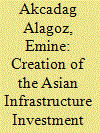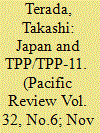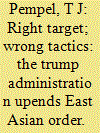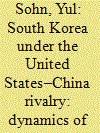|
|
|
Sort Order |
|
|
|
Items / Page
|
|
|
|
|
|
|
| Srl | Item |
| 1 |
ID:
168509


|
|
|
|
|
| Summary/Abstract |
Since it was founded in 1967, the Association of Southeast Asian Nations (ASEAN) has attracted both sceptics and proponents. With Southeast Asia’s economy growing rapidly and tied into all parts of the global economy and the region geopolitically important to the world’s major powers, how ASEAN manages its internal affairs and East Asian relations is crucial. The differences in how sceptics and proponents perceive ASEAN, and why they take up such contrasting positions, need to be fully appreciated as scholars and commentators review and assess ASEAN’s performance. This analysis uses three analytical criteria – effectiveness, legitimacy and efficiency – to juxtapose and evaluate the competing arguments of the two approaches so as to better understand how and why sceptics and proponents can examine the same institutions and events and reach very different conclusions.
|
|
|
|
|
|
|
|
|
|
|
|
|
|
|
|
| 2 |
ID:
168511


|
|
|
|
|
| Summary/Abstract |
A dualistic-order thesis has been emerged as a widely-used concept to describe East Asia’s regional dynamics. According to the thesis, the economic and security spheres of the region have become divorced from one other, whereby China and the United States dominate the economic and security realms, respectively. This paper demonstrates the deficiencies of this thesis, based on a comprehensive assessment of the economic and security developments in the region, as well as the strategic choices of small and middle regional powers. In order to form a more accurate and systematic understanding of regional prosperity and stability, this paper develops an economy-security nexus approach by integrating the interactions of regional actors in both the economic and security realms into a unified framework. From this perspective, East Asian regional order is sustained by a delicate coupling of regional economic and security configurations: ‘hot economics’ is accompanied with cooperative security interactions. Although China and the United States are not the dominant actors in either field, their relatively benign interactions in both realms collectively play a significant role by shaping the strategic environment for regional actors, allowing them to enjoy a large degree of strategic flexibility and increase their security and prosperity.
|
|
|
|
|
|
|
|
|
|
|
|
|
|
|
|
| 3 |
ID:
168510


|
|
|
|
|
| Summary/Abstract |
The aim of this article is to assess the creation of the China-led Asian Infrastructure Investment Bank within the scope of China’s smart power strategy, which will help not only to analyze China’s strategic use of its coercive and co-optive capacity, but also to understand better the concept of smart power. Given that the wisdom of statecraft can only be situationally determined, through this study I will propose the ability to achieve targeted objectives, the skill to use hard and soft power instruments in such a way that they reinforce each other, good interpretation of the existing regional and global contexts, time planning, and compatibility with long-term interests as criteria for judging the effectiveness of a smart power implementation.
|
|
|
|
|
|
|
|
|
|
|
|
|
|
|
|
| 4 |
ID:
168514


|
|
|
|
|
| Summary/Abstract |
Based on the neoclassical realism approach, this article aims to clarify factors conducive to Japan’s different roles in both participating in the trans-pacific partnership (TPP) and concluding the TPP-11 by focusing on how the US’s distinctive attitudes towards the TPP under the Obama and Trump administrations influenced Japan’s changing approaches. During the Obama administration, which needed Japan’s participation to expand the TPP in the face of China’s growing global and regional economic influence, Japan incorporated the TPP into its growth strategy and committed itself to sustaining US leadership during TPP negotiations by making necessary concessions on both the international and domestic fronts. By contrast, the Trump administration, with its strong propensity for bilateral deals to counter China’s bid for global economic hegemony with the TPP withdrawal urged Japan to change its reactive stance and take a proactive role in TPP-11 negotiations. This article opens a ‘black box’ of the political system under the second administration of Shinzo Abe, and demonstrates the strengthened function of the Prime Minister’s Office and Cabinet Secretariat or Kantei within the centralised trade policy-making apparatus as key mechanisms contributing to a departure from the traditional features that occasionally hampered Japan’s foreign economic policy initiatives.
|
|
|
|
|
|
|
|
|
|
|
|
|
|
|
|
| 5 |
ID:
168512


|
|
|
|
|
| Summary/Abstract |
President Donald Trump initiated a tariff war claiming that the ultimate target was mercantile Chinese economic practices. Numerous countries share such concerns about China. Yet the Trump administration’s approach is wrong for at least three big reasons. First, tariffs avoid addressing the most fundamental complaints about China while they undermine the longstanding and beneficial global liberal trade order. Second, the U.S. approach has been unilateral rather than multilateral, weakening America’s bargaining position while alienating close allies. Third, the Trump administration escalates what is an economic challenge into an existential threat, ignoring numerous benefits from Chinese policies as well as ignoring multiple areas where China has been a powerful global partner. Middle powers in Asia have acted collectively and individually to bolster the global trading system and avoid the worst consequences of the Trump actions while seeking to avoid making permanent binary choices between the United States and China. Beyond the immediate problems, the Trump tariff wars are creating, they also generate damaging second order effects that are undermining domestic and regional policies conducive to enhanced American strengths and an economically less mercantilist China.
|
|
|
|
|
|
|
|
|
|
|
|
|
|
|
|
| 6 |
ID:
168513


|
|
|
|
|
| Summary/Abstract |
With the advent of the Trump administration and the subsequent U.S.–China trade conflict, South Korea's trade policy is under immense pressure. The KORUS FTA has been pushed for renegotiation while the China–South Korea trade relations have stumbled after the THAAD deployment to South Korea. This challenge can be characterized by the economic-security nexus shifted from positive to negative: that is, South Korea is compelled to either sacrifice its economic benefits in favor of security interest or vice versa. In contrast to Japan that seeks to retain TPP as a way of benefitting from a regionwide trade integration and balancing both Trump unilateralism and Chinese mercantilist influence, South Korea is forced to play a more complex game. Given its deep yet asymmetric economic interdependence with China and North Korean security threats, South Korea needs to accommodate China while at the same time courting US engagement in resolving the North Korean nuclear problems.
|
|
|
|
|
|
|
|
|
|
|
|
|
|
|
|
|
|
|
|
|